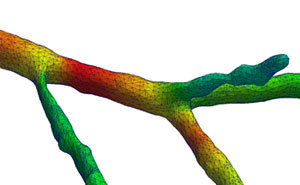06 Jan 2014
New international initiative focuses on brain mechanics and trauma research
Dr Antoine Jérusalem, from the Department of Engineering Science, is one of the founders of a new international initiative that will focus research on brain problems.
Along with colleagues from Oxford University, Purdue University, the Technical University of Madrid and the University of California they have established the International Brain Mechanics and Trauma Lab (IBMTL).
The IBMTL is a result of an internationally recognised need to study brain cell and tissue mechanics and their relation with brain functions, disease and trauma.
Dr Jérusalem said: “This initiative has been fuelled by the development of interdisciplinary collaborative efforts between engineering, medical sciences, neuroscience, biology, maths, physics and computer science. The collaboration brings together experts from different backgrounds, with their own tools and knowledge. IBMTL will enable experts in different fields, across the globe, to share resources and generate new knowledge”.

Numerical model of a neuron under mechanical loading
Professor Riyi Shi, Professor of Neuroscience and Biomedical Engineering at Purdue University in the United States, said: “The joint initiative effort under the organisation of International Brain Mechanics and Trauma Lab, headed by Dr Antoine Jerusalem of Oxford University et al., has brought multiple scientists from Europe and US together in an effort to tackle the mysteries enshrouding traumatic brain injury, a medical condition with no established treatment and insufficient understanding of its underlying pathogenesis. One of the focal points of this initiative is to understand how mechanical forces lead to devastating clinical symptoms”.
It is expected that this effort will generate unprecedented level of knowledge elucidating the pathogenic mechanisms of traumatic brain injury, which will have profound impact in establishing novel diagnostic and therapeutic approaches
Professor Shi added: “A particular strength of this group is its multi-disciplinary nature, assembling expertise including mathematical modelling, experimentation through animal models, and direct investigation in human subjects. By synergistically employing state-of-art of technology and methodology, scientists will for the first time implement a comprehensive multi-scale approach to link mechanical force to behavioural deficits via tissue deformation and subsequent structural and functional deficits in the nervous system. It is expected that this effort will generate unprecedented level of knowledge elucidating the pathogenic mechanisms of traumatic brain injury, which will have profound impact in establishing novel diagnostic and therapeutic approaches. Furthermore, I fully expect that, aside from research, these joint efforts will also generate more educational opportunities between Europe and US and ultimately benefit the lives of traumatic brain injury patients, their families, the neurotrauma community, and the world at large”.
The following fields are currently covered by the IBMTL’s experts:
- Medical: magnetoencephalography, veterinary medicine
- Neuroscience: translational neuroscience, functional connectivity and brain network architecture, brain plasticity computational modeling
- Biology: stem cells, tissue engineering
- Engineering: materials engineering, biomechanics, computational mechanics of materials
- Physics: nanoscience, cells/tissues nanomechanics, cell rheology, shockwave/ultrasound physics
- Mathematics: mathematical modelling
- Computing: supercomputing, neuroinformatics, image processing




